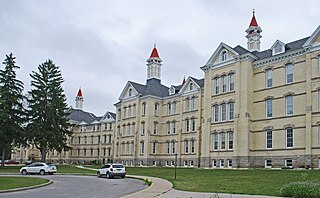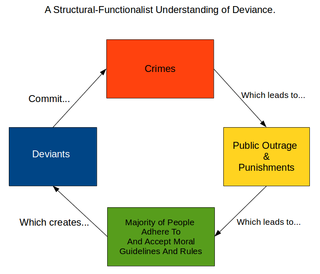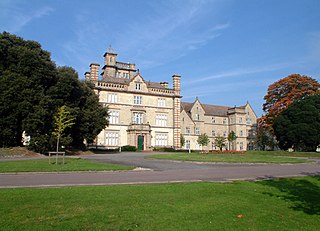
Psychiatric hospitals, also known as mental health units or behavioral health units, are hospitals or wards specializing in the treatment of severe mental disorders, such as schizophrenia, bipolar disorder, and major depressive disorder. Psychiatric hospitals vary widely in their size and grading. Some hospitals may specialize only in short-term or outpatient therapy for low-risk patients. Others may specialize in the temporary or permanent containment of patients who need routine assistance, treatment, or a specialized and controlled environment due to a psychiatric disorder. Patients often choose voluntary commitment, but those whom psychiatrists believe to pose significant danger to themselves or others may be subject to involuntary commitment and involuntary treatment. Psychiatric hospitals may also be called psychiatric wards/units when they are a subunit of a regular hospital.

Broadmoor Hospital is a high-security psychiatric hospital in Crowthorne, Berkshire, England. It is the oldest of the three high-security psychiatric hospitals in England, the other two being Ashworth Hospital near Liverpool and Rampton Secure Hospital in Nottinghamshire. The hospital's catchment area consists of four National Health Service regions: London, Eastern, South East and South West. It is managed by the West London NHS Trust.

There was systematic political abuse of psychiatry in the Soviet Union, based on the interpretation of political opposition or dissent as a psychiatric problem. It was called "psychopathological mechanisms" of dissent.

Forensic psychiatry is a subspeciality of psychiatry and is related to criminology. It encompasses the interface between law and psychiatry. According to the American Academy of Psychiatry and the Law, it is defined as "a subspecialty of psychiatry in which scientific and clinical expertise is applied in legal contexts involving civil, criminal, correctional, regulatory, or legislative matters, and in specialized clinical consultations in areas such as risk assessment or employment." A forensic psychiatrist provides services – such as determination of competency to stand trial – to a court of law to facilitate the adjudicative process and provide treatment, such as medications and psychotherapy, to criminals.

Rampton Secure Hospital is a high-security psychiatric hospital near the village of Woodbeck between Retford and Rampton in Nottinghamshire, England. It is one of three high-security psychiatric hospitals in England, alongside Ashworth Hospital in Merseyside and Broadmoor Hospital in Berkshire. It is managed by Nottinghamshire Healthcare NHS Foundation Trust.

The Maudsley Hospital is a British psychiatric hospital in south London. The Maudsley is the largest mental health training institution in the UK. It is part of South London and Maudsley NHS Foundation Trust, and works in partnership with the Institute of Psychiatry, King's College London. The hospital was one of the originating institutions in producing the Maudsley Prescribing Guidelines. It is part of the King's Health Partners academic health science centre and the National Institute for Health Research (NIHR) Biomedical Research Centre for Mental Health.

Fulbourn Hospital is a mental health facility located between the Cambridgeshire village of Fulbourn and the Cambridge city boundary at Cherry Hinton, about 5 miles (8 km) south-east of the city centre. It is managed by the Cambridgeshire and Peterborough NHS Foundation Trust. The Ida Darwin Hospital site is situated behind Fulbourn Hospital. It is run and managed by the same trust, with both hospitals sharing the same facilities and staff pool.

Castle Peak Hospital is the oldest psychiatric hospital in Hong Kong. Located at the east of Castle Peak in Tuen Mun, the hospital was established in 1961. Currently, it has 1,156 beds, providing a wide variety of psychiatric services such as adult psychiatry, forensic psychiatry, psychogeriatric services, child and adolescent psychiatry, consultation-liaison psychiatry and substance abuse treatments. All wards in the hospital are equipped to accommodate both voluntary and involuntary admitted patients.
Telepsychiatry is the application of telemedicine to the specialty field of psychiatry. The term typically describes the delivery of psychiatric assessment and care through telecommunications technology, usually videoconferencing. Telepsychiatry services can be offered through intermediary companies that partner with facilities to increase care capacities, or by individual providers or provider groups. Most commonly, telepsychiatry encounters take place at medical facilities under the supervision of onsite staff, though at-home models are becoming accepted as long as they are in compliance with HIPAA standards.
Assertive community treatment (ACT) is an intensive and highly integrated approach for community mental health service delivery. ACT teams serve individuals with the most serious forms of mental illness, predominantly but not exclusively the schizophrenia spectrum disorders. ACT service recipients may also have diagnostic profiles that include features typically found in other DSM-5 categories. Many have histories of frequent psychiatric hospitalization, substance abuse, victimization and trauma, arrests and incarceration, homelessness, and additional significant challenges. The symptoms and complications of their mental illnesses have led to serious functioning difficulties in several areas of life, often including work, social relationships, residential independence, money management, and physical health and wellness. By the time they start receiving ACT services, they are likely to have experienced failure, discrimination, and stigmatization, and their hope for the future is likely to be quite low.

Forensic social work is the application of social work to questions and issues relating to law and legal systems. This specialty of the social work profession goes far beyond clinics and psychiatric hospitals for criminal defendants being evaluated and treated on issues of competency and responsibility. A broader definition includes social work practice which in any way is related to legal issues and litigation, both criminal and civil. Child custody issues, involving separation, divorce, neglect, termination of parental rights, the implications of child and spousal abuse, juvenile and adult justice services, corrections, and mandated treatment all fall under this definition. Forensic social worker may also be involved in policy or legislative development intended to improve social justice.

Arnold Lodge is a medium secure psychiatric hospital situated in Leicester, England, run by Nottinghamshire Healthcare NHS Foundation Trust.
Atascadero State Hospital, formally known as California Department of State Hospitals- Atascadero (DSHA), is located on the Central Coast of California, in San Luis Obispo County, halfway between Los Angeles and San Francisco. DSHA is an all-male, maximum-security facility, forensic institution that houses mentally ill convicts who have been committed to psychiatric facilities by California's courts. Located on a 700+ acre grounds in the city of Atascadero, California, it is the largest employer in that town. DSHA is not a general purpose public hospital, and the only patients admitted are those that are referred to the hospital by the Superior Court, Board of Prison Terms, or the Department of Corrections.

South London and Maudsley NHS Foundation Trust, also known as SLaM, is an NHS foundation trust based in London, England, which specialises in mental health. It comprises three psychiatric hospitals, the Ladywell Unit based at University Hospital Lewisham, and over 100 community sites and 300 clinical teams. SLaM forms part of the institutions that make up King's Health Partners, an academic health science centre.

The Utah State Hospital (USH) is a mental hospital located in eastern Provo, Utah, United States of America. The current superintendent is Dallas Earnshaw.
Political abuse of psychiatry, also commonly referred to as punitive psychiatry, is the misuse of psychiatry, including diagnosis, detention, and treatment, for the purposes of obstructing the human rights of individuals and/or groups in a society. In other words, abuse of psychiatry is the deliberate action of having citizens psychiatrically diagnosed who need neither psychiatric restraint nor psychiatric treatment. Psychiatrists have been involved in human rights abuses in states across the world when the definitions of mental disease were expanded to include political disobedience. As scholars have long argued, governmental and medical institutions code menaces to authority as mental diseases during political disturbances. Nowadays, in many countries, political prisoners are sometimes confined and abused in psychiatric hospitals.

NHS England, officially the NHS Commissioning Board, is an executive non-departmental public body of the Department of Health and Social Care. It oversees the budget, planning, delivery and day-to-day operation of the commissioning side of the National Health Service in England as set out in the Health and Social Care Act 2012. It directly commissions NHS general practitioners, dentists, optometrists and some specialist services. The Secretary of State publishes annually a document known as the NHS mandate which specifies the objectives which the Board should seek to achieve. National Health Service Regulations are published each year to give legal force to the mandate.
Nottinghamshire Healthcare NHS Foundation Trust, based in Nottinghamshire, England, manages the UK’s largest and most integrated Forensic High Secure facility Rampton Hospital near Retford, High Secure Women’s, High Secure Deaf, High Secure LD and Autistic as well as High Secure Men’s Mental Health), two medium secure units, Arnold Lodge in Leicester and Wathwood Hospital in Rotherham, and a low Secure Unit, Wells Road Centre at Mapperley in Nottingham.

Herschel Albert Prins (1928–2016) was a British professor of criminology. His career spanned over 60 years in work pertaining to forensic psychiatry, and his appointments included positions at the universities of Leeds, Loughborough, Leicester and Birmingham. His roles included HM probation inspectorate, parole board engagement, and involvement in mental health review tribunals and the mental health act commission. He worked with people with malicious activity, antisocial and disinhibited behaviour, unusual sexual deviations and people who behaved dangerously.

Orville Blackwood was a Jamaican-born British man, whose death at Broadmoor Hospital on 28 August 1991, following the administration of large doses of antipsychotic medications, resulted in wide media coverage after an inquiry into the circumstances surrounding his death. The inquiry published a report in 1993 titled 'Report of the committee of inquiry into the death in Broadmoor Hospital of Orville Blackwood, and a review of the deaths of two other Afro-Caribbean patients: "big, black and dangerous?".













